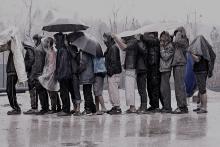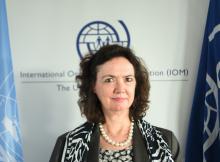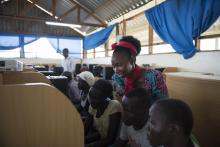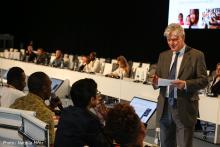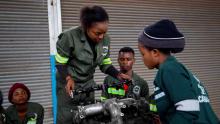New World, New Radio: Celebrating the Resilience of the World’s Most Widely Used Medium
As the fight against the pandemic continues, radio has been a close companion for many around the world, with broadcasters curating trustworthy information, countering misinformation and providing much-needed entertainment during lockdowns.
Protecting Lower-Income Countries with COVID-19 Vaccines Requires Global Solidarity
The medical and moral imperative for equitable access to COVID-19 vaccines is why COVAX was created. Co-led by Gavi, the Vaccine Alliance, together with the World Health Organization (WHO) and the Coalition for Epidemic Preparedness Innovations (CEPI), COVAX is a truly global solution.
International Holocaust Remembrance Day: A Survivor’s Plea
There is no doubt that we need to broadcast a warning and act now to purvey the truths of history and call out hate groups whose poisonous beliefs could unleash future plagues against humanity.
Increasing Youth Participation in Climate Action
Young people, who constitute the majority of the population in many countries, are becoming a driving force in pursuing a low-carbon and climate-resilient future.
Reimagining Human Mobility in a Post-COVID-19 World
No phenomenon has been as affected by humanity’s reaction to COVID-19 as migration. Simply put, humans are the main vector for the transmission of the virus, so the mobility aspects of our response had to be factored in from day one.
The Case for Connectivity, the New Human Right
This year’s Human Rights Day theme focuses on the need and opportunity to build back better in the wake of the pandemic by ensuring that human rights are central to recovery efforts. And make no mistake about it, digital connectivity should be a human right.
Do People Still Care About Human Rights?
The Universal Declaration of Human Rights, adopted on 10 December 1948, inspired peoples across the world and laid the foundation for governance and institutional reforms, for progressive, people centred legislation and education that reverberates from generation to generation.
The Impact of COVID-19 on Women
Among other measures to address the impact of the COVID-19 pandemic on women, the United Nations could develop gender-sensitive monitoring and impact checklists to assist countries with follow-up and assessment of their achievements in all sectors during the crisis.
Media and Information Literacy in an Age of Uncertainty
In order to protect democracy, the transition to a digital society and economy must be accompanied by a media and information literacy revolution.
Making Industrialization in Africa Sustainable
Industrial development in Africa needs to be inclusive and sustainable: inclusive so that all sectors of society can participate and benefit from industrialization, and sustainable so that the environment does not suffer.









